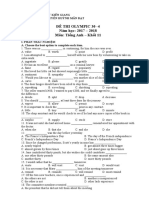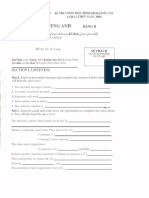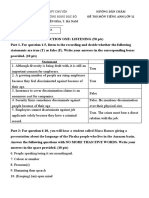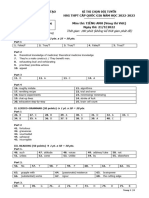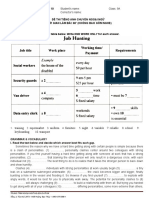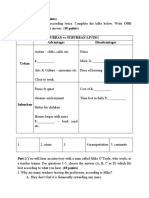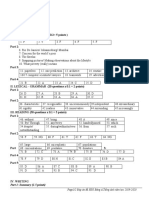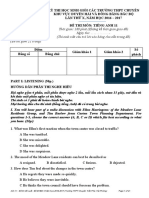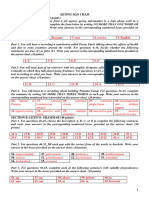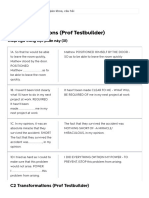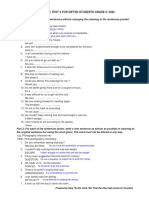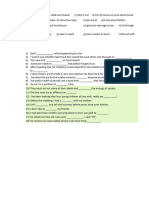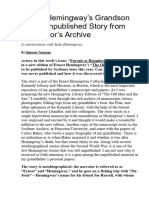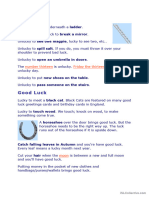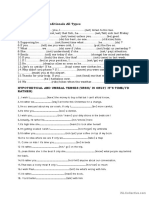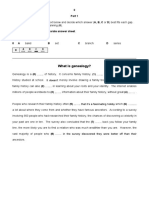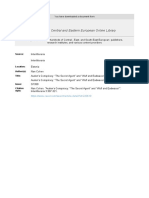0 ratings 0% found this document useful (0 votes) 941 views 1 page Unit 5 Reading
Copyright
© © All Rights Reserved
We take content rights seriously. If you suspect this is your content,
claim it here .
Available Formats
Download as PDF or read online on Scribd
Go to previous items Go to next items
Save unit 5 reading For Later At home with books
In an age when literature is increasingly going digital, books hold a
curious role in some people's homes. Thare are few purchases which,
conce used, are placed on proud display and carted round as families
move from place to place, And yet that's precisely what sometimes
happens with books, despite the existence of a digital equivalent. After
all, bath the music industry and other aspects of the print media have felt
the heat of vial competition — why not books? Part ofthe explanation
for this may le in the fact that, when it comes to the crunch, nosing
around someurie’s buukshielves fs interesting, "You vat tel Wt ebout
someone by their collection of books,’ says Doug Jeffers, owner of @
London bookstore.
I's not just the quantity of titles on display, however, that speaks
volumes; generation, occupation, political leanings, leisure pursuits (even
where they go on holiday) — clues to all of these abound, if you care to
analyse the contents of someone's bookshelves, and even casual vistors
aren't slow to form judgements. Evidence ofthis manifested itself when
the President of the USA made an informal call on the English Prime
minister at home recently, and for some reason the pait posed for photos
in the kitchen. One of the snapshots was suosequenty released to the
press, and widely published. Thee then ensued much speculation as to
how the complete works of Shakespeare had ended up on the shel in
the background rather than a cookery book
Houschold stylist Abigail Hall agres. I often style houses for sale and
you'd be amazed how important the contents of the bookcase can be’
Apparently, people use such clues to form judgements about the type of
petson who Ives ina property that’s up fr sale, and this may affect how
they feel about going atead with the aurchase. Perhaps we all seek out
thers whose tastes in such matters match our own, and we can imagine
living happily ina soace that like-minded people have made homely. And
even if we're not thinking of putting our home on the markt, instinct
tells us that however much they were enjoyed, paperbacks read on the
beach might be better put away in a cupboard, whilst the unopened
assis are destined for display
1 _ Inthe first paragraph, the writer is 4
‘A outlining the reasons far changing priorities
B drawing our attention to an ongoing process.
© seeking to account for a seemingly loge
D questioning our assumptions about people’ behaviour
2 What does the mention of political figures in the
second paragraph serve to illustrate?
A the public's curiosity about celebrity lifestyles
B the importance of background detail in photography
€ the extent to which books tend to attract people's
attention 5
D the false impression that can be gained from books
on display
3 Abigail Hall's experience suggests that the books
(on show in a house for sale
A may not be as rearesentative ofthe owners’ taste as
people assume,
B can create an affinity between sellers and prospective 6
buyers,
C might help buyers to assess how keen the owners
are to sell
D could mislead people into buying an unsuitable
property.
For the interior designer, however, the art of reputation-
rmanagement-via-bookshelf i not the only issue. Books
can also became an interactive display tool. Tey can
almostbe sculptural in that they offer a physical presence,
explains Abigall Hall. ‘I's not just sbout stacking them
(on a bookcase i's how you stack them. I've seen books
arranged by colour, stacked on top of each other. Once |
saw 2 load of coffee-table books piled up to become a
coffe table in themselves. Books define a space, if you
have some books and a comiy chair, you've immediately
created an area.” its a wick of which courtiess hotels,
cafés and waiting rooms for fee-paying cients are only
too aware. Placing a few carefully-chosen books atop
coffee tables is about creating an ambiance. No one
actually engages with the content
And this principle can be transfered to the home ‘ve
rt actually read any of them | just love the bindings! So
said the acess, Davina Tayo, earlier this year when she
decided to put her house on the market - complete with
its carefuly-sourced collection of classic books. Rarely
removed from their perch on a bookcase in the living
room, their primary purpose was to disguise Taylor's walk-
in fridge. and so, with the fridge no longer destined to be
2 feature in her if, the books were deemed redundant.
Perhaps, then, the future of books les in this. With more
and more being bought in the undeniably hancier digital
format, the first casualties of the tangible varity are
likely to be the beach-read paperbacks — the ones that,
if you invite Abigall Hal around, would be relegated to
the garage anyway. But given the uses to which we put
Cur other tomes — whether they'te deployed to show off,
look pretty, or create an atmosphere ~ the odds of them
hanging around look good. The kudos of great work is
still there, and there's nothing like being, and being seen
to be, in possession ofthe real thing,
‘What is implied about interior designers in the
fourth paragraph?
‘A They regard books as litle more than additional
pieces of furniture
B They are likely to underestimate the impact of the
content of books
C They sometimes show a lack of respect for the true
function of boots.
D They understand the effect of books on the users
of spaces thay create
Davinia Taylor no longer wants her books because
AA she has no use for them beyond their current purpose
B she accepts that they dont reflect her taste in reading
she realises she selected the titles for the wrong
reasons.
D she feels they are an integral part of the house she's
selling
In the final paragraph, the writer expresses
A a personal preference for books in digital format
B optimism regarding the future of non-clgital books.
regret that the content of al books is not more valued.
D ahope that attitudes towards books wil be different
in the future
73

